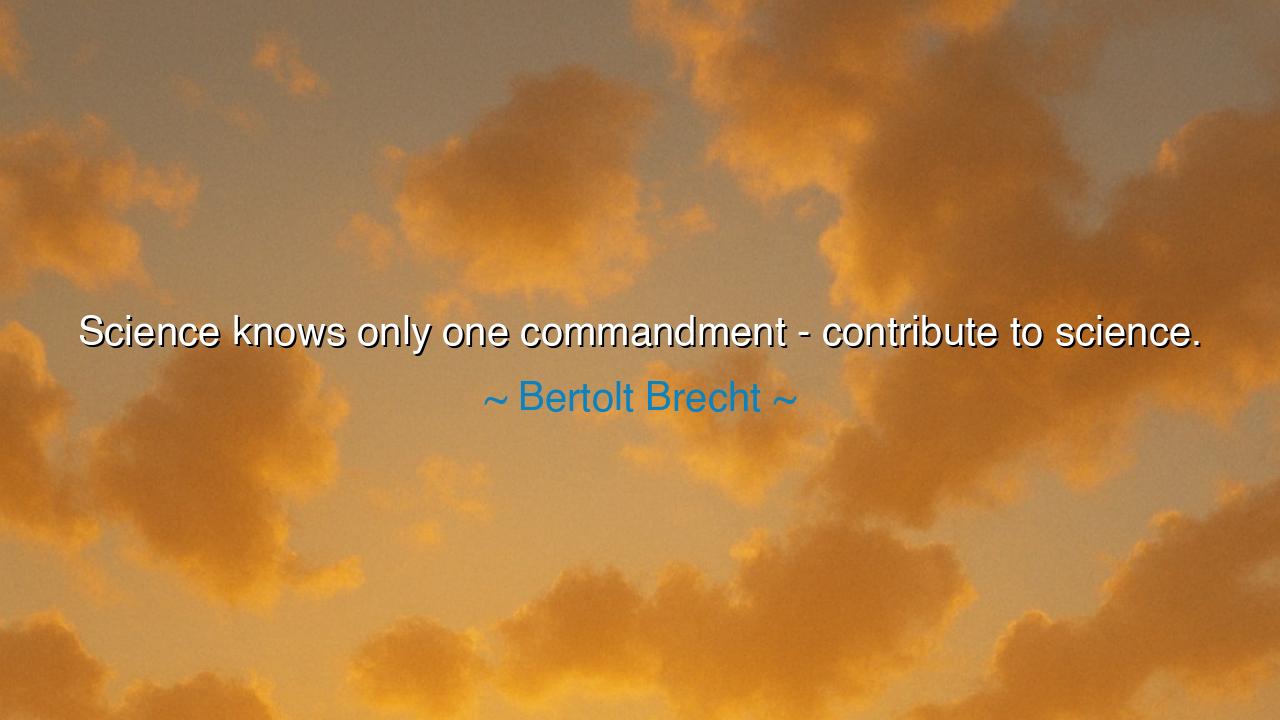
Science knows only one commandment - contribute to science.






"Science knows only one commandment – contribute to science." These words, uttered by the keen and powerful mind of Bertolt Brecht, stir the soul and call upon the very essence of human curiosity and endeavor. They echo through the chambers of time, urging us to dedicate ourselves wholly to the pursuit of knowledge. For science, Brecht reminds us, is not a mere study or pastime; it is a sacred mission, an imperative that transcends the personal, the fleeting, and the trivial. The true purpose of science is to contribute—to add something new, something valuable, to the ever-growing tapestry of understanding that binds humanity together.
Let us look back to the great thinkers of the ancient world, who understood that the pursuit of knowledge was a calling, a duty, and a responsibility. The Greek philosophers, such as Socrates and Aristotle, lived by the principle that knowledge is not to be hoarded or concealed, but to be shared for the benefit of all. For them, the search for truth was not just a personal quest, but a sacred contribution to society. Plato spoke of the philosopher-king, one who, having acquired wisdom, would use that knowledge not for personal gain, but for the betterment of the state and the world. In this way, science was not a luxury, but a duty—a commandment as Brecht puts it.
To contribute to science is to become part of the great human endeavor that has propelled us forward through the ages. Think of the scientists who laid the foundations for modern medicine. Edward Jenner, for example, through his discovery of the smallpox vaccine, did not simply make a contribution for his own glory. His work became a gift to the entire world—a gift that has saved millions upon millions of lives. He gave himself to the pursuit of science, contributing to a body of knowledge that would grow and evolve, benefiting generations yet to come. His contribution was not for the sake of fame, but for the greater good, for the collective welfare of humanity. This is the essence of Brecht's quote: to serve science, to contribute, is to serve something greater than oneself.
Consider also the work of Marie Curie, whose discoveries in the field of radioactivity forever altered the landscape of both science and medicine. Curie’s dedication to science did not come with promises of riches or accolades. In fact, it came at great personal sacrifice—her health, her reputation, and the life of her husband, Pierre Curie, were all marked by their work. But in the end, her contributions changed the world. She taught us that science, when pursued with purpose and dedication, becomes a legacy, one that reaches beyond time and space, impacting the lives of those who come long after us. It is this selfless commitment to the greater good that Brecht speaks of—the commandment to contribute, to build upon the work of those before us, and to leave the world a better place than we found it.
Brecht’s declaration also calls upon us to reflect on the purpose of science in our own lives. Too often, we see science as a field to be explored for personal advancement—for the prestige of discovery, the rewards of innovation, or the fame that comes with being known. But the true purpose of science is not to elevate the individual, but to elevate humanity. It is to serve truth, to contribute to the collective knowledge of the world, and to advance human civilization. To contribute to science is to become part of something immortal, a force that binds all of us across generations, places, and times. The discoveries we make, the knowledge we share, form the fabric of our civilization, and our contributions help to shape the future.
The lesson, then, is not just for scientists in laboratories, but for all of us who seek to contribute in any way to the world. Whether through art, philosophy, leadership, or any other field, the essence of Brecht’s words remains the same. Contribute to the greater good. Seek to add to the knowledge and progress of humanity. Share what you learn, what you know, and what you can give. In doing so, you not only fulfill your purpose as an individual, but you elevate the collective. We are all, in essence, contributing to the science of life itself, whether through small acts of kindness, great works of intellect, or quiet acts of creativity.
In your own life, ask yourself: How can you contribute to the world? What knowledge do you possess, and how can it serve the greater good? Do not let your life pass without adding your own contribution to the vast and ever-expanding body of human knowledge. As Brecht so powerfully reminds us, the commandment of science, the purpose of our existence, is to leave the world better than we found it—to contribute to something greater than ourselves. Science is not an abstract field confined to laboratories; it is a living force that lives in each of us. Seek always to contribute, to advance, to share, and in doing so, you will live a life of purpose, and fulfill the greatest commandment of all.






AAdministratorAdministrator
Welcome, honored guests. Please leave a comment, we will respond soon